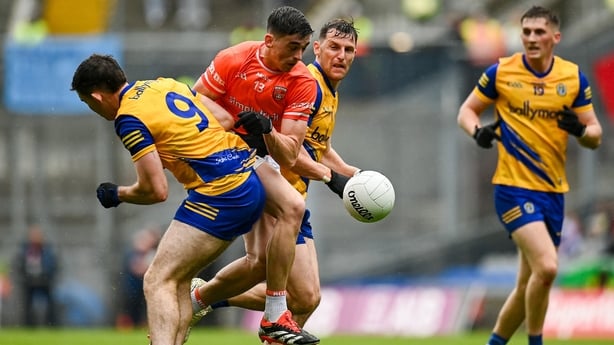Ciarán Whelan says the weekend’s All-Ireland quarter-final action was another reminder that Gaelic football needs to change if it wants to capture the public’s imagination.
Only Taylor Swift would be disappointed to see the guts of 100,000 people turn up at a stadium on consecutive days, but the 49,896 punters who paid into Croke Park on Saturday, and the 47,406 who went through the turnstiles a day later, are down on the number that might have made the journey a decade ago.
Read more: Rule trials may be extended as far as October with feedback aiding FRC
Leinster Rugby were the last side to sell out the Jones’ Road venue when they defeated Northampton in this season’s Investec Champions Cup semi-final.
Gaelic football’s drift towards basketball, with short passing and teams retreating in numbers as soon as they lose possession, is part of the reason why people have begun to turn their back on the game.
Added to that a new calendar, which has taken the All-Ireland championship out of its traditional post-Premier League/provincial rugby season slot, has moved the early championship games into direction competition with other sports.
While the increased number of games, when money is tight, and when many of the new games have little jeopardy, has meant that the GAA has struggled to build supporter momentum in 2024.
The Leinster football final, which would have attracted close to sell out crowds earlier in this century – particularly when Dublin were involved – saw just 23,113 pay through the turnstiles in May when the Sky Blues defeated Louth for their 14th consecutive title.
For Whelan, who was speaking on the RTÉ GAA Podcast, it’s a sign that the powers that be are correct to be looking at rule changes for 2025.
“I think it’s well documented that, as a spectacle, the game is in trouble,” the two-time All-Star began.
“We’ve recognised that. We’ve spent a lot of years watching crap games. You get dragged into a false sense of security sometimes earlier in the year in that the league games can be really good. Teams are playing with a little more adventure, they’re taking more risks, they’re trying stuff out – you see a lot more goals.
“Ultimately, if you look at all the teams that played this weekend – push Dublin and Kerry aside – they’re all underpinned by strong defensive systems and non-concession of goals. When you get to the knockout stages, you marry that with the fear of losing and it becomes a stalemate.
“It’s hugely positive that there’s recognition and this is a serious approach by this rules group now to really look at the game. All the proposals that they’re coming up with are favouring the team – or the man – in possession.
“To try to speed up the game and give the benefit of the doubt to the person that has the ball in their hand.”

While Gaelic football has struggled to draw in the punters, hurling, where a limited number of elite counties complete on a regular basis, has managed to hold firm.
That is despite the dominance of Limerick, who are two games away from winning five All-Irelands on the bounce, having already claimed a six consecutive Mick Mackey Cup in Munster.
For Tomás Ó Sé, who was speaking on the same podcast, allowing every county the chance to compete for Sam Maguire every year naturally leads to supposedly weaker counties trying to stifle the perceived stronger counties, which can result in very aesthetically unattractive, defensive football.
“If there was three tiers in football you probably wouldn’t have the same fear,” he said.
“It’s actually an All-Ireland where all teams play. Every team isn’t at the same level, and then Donegal in 2012 said we can’t beat them going man on man.
“They’d get their arses handed to them so they set up a different way and provided a template because all teams are playing against everybody.
“Whereas the hurling, you have the best teams playing against each other. I’m not sure it would have gone down the road of being as defensive if all you had was the top seven or eight teams.
“That’s all you have in the hurling, the All-Ireland is seven or eight teams.”
Listen to the RTÉ GAA Podcast on the RTÉ Radio Player, Apple Podcasts, Spotify, or wherever you get your podcasts
Watch the All-Ireland Hurling Championship quarter-finals, Kilkenny v Clare (3pm on Saturday on RTÉ One) and Limerick v Cork (4pm on Sunday on RTE2). Both games available on RTE Player. Follow a live blog on rte.ie/sport and the RTÉ News app and listen to commentary on RTÉ Radio 1
Watch the All-Ireland Camogie Championship quarter-finals, Kilkenny v Dublin (12.30pm on Saturday on RTÉ One) and Galway v Waterford (1.30pm on Sunday on RTE2). Both games available on RTE Player
